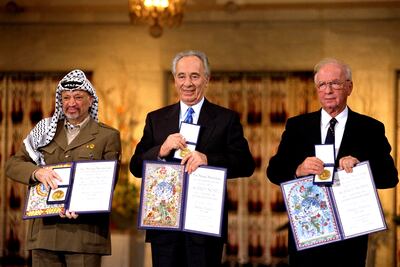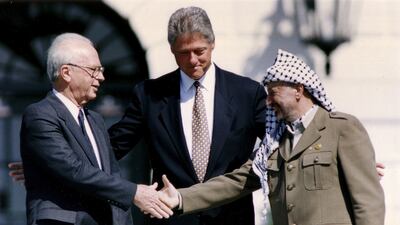On the White House lawn three decades ago, US president Bill Clinton stood at the centre of a historic political moment: the handshake between Palestinian Liberation Organisation chairman Yasser Arafat and the Israeli prime minister at the time, Yitzhak Rabin.
Earlier, the leaders had signed the Oslo Accords, widely considered a major breakthrough in the Palestinian-Israeli conflict that would herald a new era for the Middle East.
But experts say that 30 years after the agreement, the prospects for finalising the deal that envisioned the establishment of an independent Palestinian state are as remote as ever, and the prospect of peace between the two sides remains elusive.
“The process got stuck very, very early on,” Khaled Elgindy, who served as an adviser to the Palestinian leadership during negotiations from 2004 to 2009, told The National.
“But instead of reforming it, they just kept plugging away.”
First signed in Washington on September 13, 1993, the Oslo Accords, also known as the Oslo Peace Process, were a series of agreements and negotiations between Israel and the PLO that aimed to resolve the decades-old conflict.
The initial agreement, known as the Declaration of Principles, laid out a framework for the interim self-government of Palestinian territories in the West Bank and Gaza Strip.
Amid a lack of agreement on core and contentious issues such as the status of Jerusalem, Jewish settlements, borders, Palestinian refugees’ right of return and a number of others, negotiators agreed to reach a permanent settlement on these unresolved issues within five years.
But despite efforts by successive US administrations to broker a final deal between the two sides, no resolution was ever reached and violence took over instead.
Soon after the agreement was signed, suicide bombings by Palestinian militant groups who opposed the talks became common occurrences. Mr Rabin was assassinated in 1995 by a right-wing Jewish extremist.

Following failures of the Camp David Summit talks in 2000, the Second Intifada – or Palestinian uprising – erupted after Israeli troops stormed Al Aqsa Mosque, setting off years of suicide bombings by Palestinians, as well as Israeli sieges, targeted killings and aerial attacks on the West Bank and the Gaza Strip.
“There were direct negotiations to come to a final settlement, but what was supposed to be interim became permanent and the occupation has now lasted for 56 years,” Edward Djerejian, who served as US ambassador to Israel in 1993-1994, told The National.
“Looking back, I think the failure of Oslo was that the interim remains interim.”
The last round of talks took place in 2014, under Barack Obama.
Observers point to two major flaws in the accords: a power imbalance between the Palestinian and Israeli sides, and Israel’s insistence on expanding settlements in the West Bank – areas that had been reserved for a future Palestinian state.
According to International Law and the Geneva Conventions, Jewish settlements in the occupied West Bank are illegal.
“Oslo went wrong from the construction of it,” Diana Butto, a legal adviser to the Palestinian negotiating team from 2000 to 2006, told The National.
“Getting people who are living under military occupation, negotiating with their occupier – it totally fails to understand the power imbalance that exists between the two sides.
“And the US never spent any time trying to balance out that imbalance of power.”
In 1993, there were about 250,000 Jewish settlers living in the West Bank and East Jerusalem in 128 settlements, according to Peace Now, an Israeli advocacy group that promotes the two-state solution. Now, close to 700,000 live in both areas in about 300 settlements and outposts.
One of the main problems, Mr Djerejian noted, is that the US position on the settlements was based on political considerations rather than international law.
Jimmy Carter was the last US president to call settlements illegal. Successive administrations have called them an “obstacle to peace” while others, including the administration of Donald Trump, declined to denounce them at all.
“We started out as the administration saying that settlement activities are illegal, then the phraseology began to soften, saying they’re an obstacle to peace,” Mr Djerejian said.
“And yet, the bedrock position of international law is that they are illegal.”
After Israel elected the most right-wing government in its history late last year, prospects of ever reaching a two-state solution or ending the seemingly intractable conflict seem more distant than ever.
So far, the administration of Prime Minister Benjamin Netanyahu's government has enabled settlement building, and several ministers in his cabinet have openly discussed annexing the West Bank.
Meanwhile, the administration of President Joe Biden has made little effort to restart talks and has instead focused on expanding the Abraham Accords, the 2020 agreement the UAE and Bahrain signed with Israel, establishing relations.
Morocco and Sudan later signed similar agreements, and the US is now pushing for Saudi Arabia to negotiate its own deal with Israel.
“The Abraham Accords is yet another sign that is working against the two-state solution because it's basically signalling that Arab states have moved on,” Mr Elgindy said.
“The deals are essentially saying: 'We're not going to sit around and wait for this unicorn called the Palestinian state.'”


